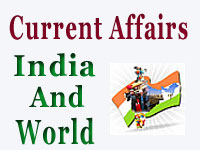(Current Affairs) India and The World | January: 2015

India & The World
- Pakistan Taliban threatens to attack India (Free Available)
- U.S.-India pact paves the way for global trade deal (Free Available)
- Germany hopeful of solution over language row soon (Free Available)
- Australia-India sign pact to enhance skill development (Free Available)
- India-Australia seek early closure of civil nuclear deal (Only for Online Coaching Members)
- Musharraf warns of proxy war with India in Afghanistan (Only for Online Coaching Members)
- UNICEF wants to support India in ‘Clean India Mission’ (Only for Online Coaching Members)
- Trilateral Coast Guard exercise ‘Dosti-XII’ ends (Only for Online Coaching Members)
- Tax-free bonds 2013 are still a good investment (Only for Online Coaching Members)
- New GDP data with 2011-12 as base year in Jan 2015 (Only for Online Coaching Members)
Pakistan Taliban threatens to attack India
-
Tehreek-e-Taliban Pakistan (Jamaat ul-Ahrar), the group that claimed responsibility for the suicide attack at a Pakistani check post near the Wagah border that killed 61 people, has threatened attacks on India next. In a telephone interview to agency Reuters, the spokesperson of the group Ehsanullah Ehsan (assumed name) said. “I have already conveyed it to Modi... that if our suicide bombers can carry out attacks.
-
On this side of the border, they can easily do it on other side of the border in India,” he told Reuters by telephone from an undisclosed location.
-
“I told him that his hands are red with the blood of Kashmiri mujahideen (fighters) and innocent people of Gujarat for which he would have to pay the price.”
-
Ehsan was probably referring to an earlier message on his twitter account, which said, “You (Modi) are the killer of hundreds of Muslims. We wl (will) take the revenge of innocent people of Kashmir and Gugrat” (sic).” The message has since been deleted, but sources said PM Modi has been briefed about the threat since, and security agencies are taking the threat “very seriously”.
U.S.-India pact paves the way for global trade deal
-
Decks have been cleared for a possible global trade deal after India and the U.S agreed on the way forward to break the logjam in global trade negotiations. With the agreement in place, India is all set to move its proposal on food security before the WTO’s General Council at its next meeting scheduled for early December.
-
This proposal will seek to make open-ended the interim protection of a ‘peace clause’ that was agreed to at the Bali Ministerial last December.
-
The clause safeguards support prices for farmers against the WTO’s limits on agricultural subsidies. India was in danger of breaching these subsidy caps.
-
India wants to make sure that this protection would be available in perpetuity, should a permanent solution to the problem of the WTO agriculture subsidy caps not be found. Whether the Bali Declaration provides that the ‘peace clause’ could be available beyond 2017 was open to interpretation.
-
Announcing that an agreement had been reached with the U.S, Minister of State for Commerce and Industry Nirmala Sitharaman said on Thursday that the U.S had agreed that India’s right to protect its right to food security cannot be denied by the WTO, paving the way for removing the imperfections in the Bali Ministerial package.
-
U.S Trade Representative Michael Froman also released a statement which said the agreement with India reflected shared understandings regarding the WTO’s work on food security.
-
Sources on the Indian side indicated that the resolution was possible after an understanding was reached with the U.S that India’s subsidies are not trade-distorting and aimed at achieving food security. India, on the other hand, was able to reassure the U.S that it was not opposed to trade facilitation and in fact was on course to implement it.
Germany hopeful of solution over language row soon
-
Even as a row continued to simmer over the Human Resource Development Ministry’s decision to take off German from the third language slot of the Kendriya Vidyalaya curriculum, Germany hoped a solution would be found soon.
-
German Ambassador Michael Steiner said a solution would be found to allow the language to be taught in these schools.
-
He expressed confidence that after raising the issue with the Union government, both sides would be able to work out a way that would take care of children’s desire to learn foreign languages.
-
Human Resource Minister Smriti Irani said an investigation had been ordered since the existing arrangement violated the three-language formula.
-
After an MoU between the Kendriya Vidyalaya Sangathan and the German government in 2011, German was added to the third language list.
Australia-India sign pact to enhance skill development
-
Australia and India have decided to map common standards on job roles and further strengthen bilateral cooperation on skill development. The Indian Government has also decided to expand the capacities of 12,000 industrial training institutes.
-
At the ‘3rd India Australia Skills Conference: Skills for Better Business’ in Mumbai, a memorandum of understanding (MoU) was signed between the National Skill Development Corporation, India (NSDC) and TAFE Directors, Australia, on Technical and Vocational Education and Training cooperation.
-
The purpose is to further strengthen cooperation between the two to enhance and extend bilateral cooperation between Australia and India, a statement noted. The aim is to contribute positively to the development of technical and vocational education and training related linkages between India and Australia, it added.

